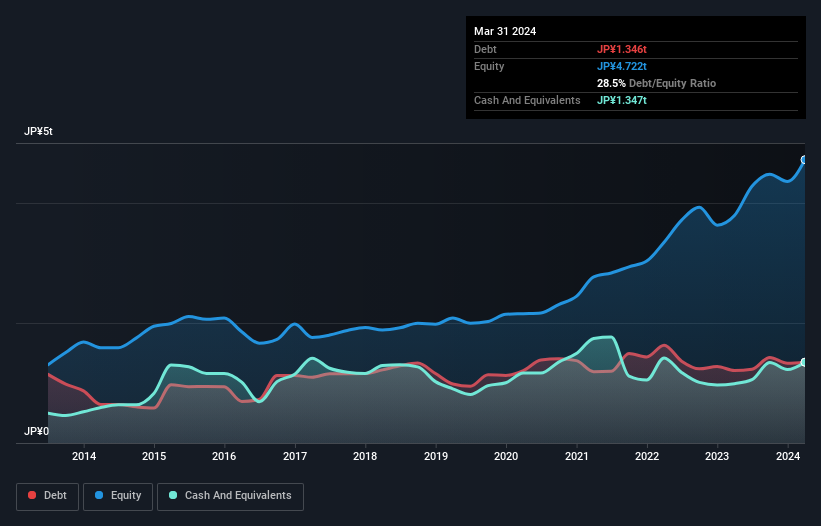
The external fund manager backed by Berkshire Hathaway's Charlie Munger, Li Lu, makes no bones about it when he says 'The biggest investment risk is not the volatility of prices, but whether you will suffer a permanent loss of capital.' So it seems the smart money knows that debt - which is usually involved in bankruptcies - is a very important factor, when you assess how risky a company is. We note that Panasonic Holdings Corporation (TSE:6752) does have debt on its balance sheet. But the real question is whether this debt is making the company risky.
When Is Debt A Problem?
Debt assists a business until the business has trouble paying it off, either with new capital or with free cash flow. Ultimately, if the company can't fulfill its legal obligations to repay debt, shareholders could walk away with nothing. However, a more frequent (but still costly) occurrence is where a company must issue shares at bargain-basement prices, permanently diluting shareholders, just to shore up its balance sheet. Having said that, the most common situation is where a company manages its debt reasonably well - and to its own advantage. The first thing to do when considering how much debt a business uses is to look at its cash and debt together.
Check out our latest analysis for Panasonic Holdings
What Is Panasonic Holdings's Net Debt?
As you can see below, at the end of March 2024, Panasonic Holdings had JP¥1.35t of debt, up from JP¥1.21t a year ago. Click the image for more detail. But on the other hand it also has JP¥1.35t in cash, leading to a JP¥945.0m net cash position.

How Strong Is Panasonic Holdings' Balance Sheet?
We can see from the most recent balance sheet that Panasonic Holdings had liabilities of JP¥3.12t falling due within a year, and liabilities of JP¥1.57t due beyond that. On the other hand, it had cash of JP¥1.35t and JP¥1.36t worth of receivables due within a year. So its liabilities outweigh the sum of its cash and (near-term) receivables by JP¥1.98t.
This deficit is considerable relative to its very significant market capitalization of JP¥3.09t, so it does suggest shareholders should keep an eye on Panasonic Holdings' use of debt. This suggests shareholders would be heavily diluted if the company needed to shore up its balance sheet in a hurry. Despite its noteworthy liabilities, Panasonic Holdings boasts net cash, so it's fair to say it does not have a heavy debt load!
Also positive, Panasonic Holdings grew its EBIT by 23% in the last year, and that should make it easier to pay down debt, going forward. There's no doubt that we learn most about debt from the balance sheet. But ultimately the future profitability of the business will decide if Panasonic Holdings can strengthen its balance sheet over time. So if you're focused on the future you can check out this free report showing analyst profit forecasts.
Finally, a business needs free cash flow to pay off debt; accounting profits just don't cut it. While Panasonic Holdings has net cash on its balance sheet, it's still worth taking a look at its ability to convert earnings before interest and tax (EBIT) to free cash flow, to help us understand how quickly it is building (or eroding) that cash balance. Looking at the most recent three years, Panasonic Holdings recorded free cash flow of 44% of its EBIT, which is weaker than we'd expect. That weak cash conversion makes it more difficult to handle indebtedness.
Summing Up
Although Panasonic Holdings's balance sheet isn't particularly strong, due to the total liabilities, it is clearly positive to see that it has net cash of JP¥945.0m. And we liked the look of last year's 23% year-on-year EBIT growth. So we don't have any problem with Panasonic Holdings's use of debt. The balance sheet is clearly the area to focus on when you are analysing debt. However, not all investment risk resides within the balance sheet - far from it. Be aware that Panasonic Holdings is showing 1 warning sign in our investment analysis , you should know about...
If you're interested in investing in businesses that can grow profits without the burden of debt, then check out this free list of growing businesses that have net cash on the balance sheet.
New: Manage All Your Stock Portfolios in One Place
We've created the ultimate portfolio companion for stock investors, and it's free.
• Connect an unlimited number of Portfolios and see your total in one currency
• Be alerted to new Warning Signs or Risks via email or mobile
• Track the Fair Value of your stocks
Have feedback on this article? Concerned about the content? Get in touch with us directly. Alternatively, email editorial-team (at) simplywallst.com.
This article by Simply Wall St is general in nature. We provide commentary based on historical data and analyst forecasts only using an unbiased methodology and our articles are not intended to be financial advice. It does not constitute a recommendation to buy or sell any stock, and does not take account of your objectives, or your financial situation. We aim to bring you long-term focused analysis driven by fundamental data. Note that our analysis may not factor in the latest price-sensitive company announcements or qualitative material. Simply Wall St has no position in any stocks mentioned.
Have feedback on this article? Concerned about the content? Get in touch with us directly. Alternatively, email editorial-team@simplywallst.com
About TSE:6752
Panasonic Holdings
Research, develops, manufactures, sells, and services various electrical and electronic products worldwide.
Flawless balance sheet, undervalued and pays a dividend.
Similar Companies
Market Insights
Community Narratives


